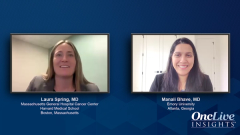
Clinical Scenario: A 65-Year-Old Post-Menopausal Woman With Metastatic Breast Cancer
Oncologists present the clinical scenario of a 65-year-old woman with recurrent HR-positive, HER2-low breast cancer, and discuss optimal sequencing of systemic therapies in this setting.
Episodes in this series

The discussion shifts to a new case of a 65-year-old postmenopausal woman with a history of stage 1 hormone receptor-positive, HER2-negative breast cancer diagnosed 6 years ago and treated with 5 years of adjuvant aromatase inhibitor therapy.
She now presents with chest pain and shortness of breath. Workup reveals a solitary lesion in the right lung, biopsy-confirmed as recurrent breast cancer that is strongly hormone receptor-positive and HER2-negative (IHC 1+, non-amplified on FISH). NGS testing was negative for actionable mutations. She was started on first-line aromatase inhibitor therapy.
After 18 months, scans show progression in the lung. Liquid biopsy did not detect ESR1 or PIK3CA mutations. She is now discussing next treatment options with her oncologist.
Spring asks Bhave if this patient's case is representative of metastatic HR+/HER2-low patients seen in practice. Bhave agrees it is a common scenario, though a bit unusual for the initial stage 1 diagnosis to recur metastatically, as that risk is typically <10%.
Bhave is glad comprehensive genomic profiling was done upfront on the metastatic biopsy, as tissue is more sensitive for detecting mutations like PIK3CA compared to liquid biopsy alone. Her approach aligns with using an aromatase inhibitor first-line unless there was a rapid adjuvant relapse, then pursuing plasma genomics at progression to guide therapy selection.
Overall, this case highlights real-world evaluation and first-line management of HR+/HER2-low metastatic breast cancer, in line with current standards incorporating genomic profiling.
This summary was AI-generated and edited for clarity.




































